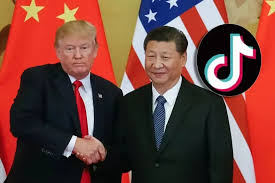WASHINGTON, D.C. — U.S. President Donald Trump has announced that his administration has reached a deal with China that will allow TikTok to continue operating in the United States, ending months of uncertainty over the future of the hugely popular video-sharing app.
Trump said he would speak with Chinese President Xi Jinping on Friday to confirm the details of the agreement, which avoids a complete ban that had been looming over the platform.
“We have a group of very big companies that want to buy it,” Trump told reporters Tuesday. “Kids want it so badly. I had parents calling me — not for themselves but for their kids. They say if I don’t get it done, they’ll be in big trouble with their kids. And I think it’s great. I hate to see value like that thrown out the window.”
Trump later signed an executive order extending the deadline for TikTok’s Chinese owner, ByteDance, to divest from the platform until December 16. Failure to complete the divestment by then would trigger a ban.
According to reports from The Wall Street Journal and The New York Times, the proposed deal would reduce ByteDance’s ownership stake to less than 20 percent, effectively giving U.S.-based investors and technology partner’s majority control of the app.
China’s state-run People’s Daily praised the deal as an example of “cooperation for mutual benefit,” while reiterating Beijing’s commitment to protect the rights of Chinese companies abroad.
Experts, however, have raised questions about what concessions the U.S. might have offered China in return for the agreement.
“Trump clearly has political and business interests in keeping TikTok alive,” said Yan Liang, an economics professor at Willamette University. “I’d be surprised if China agreed without securing some benefits of its own.”
TikTok, which has more than 170 million U.S. users, has been at the center of a heated debate in Washington. Lawmakers from both parties have expressed fears that the app could be used by Beijing to spy on Americans or spread propaganda.
Trump had previously attempted to ban TikTok during his first term but later reversed course, promising to “save” the platform during his re-election campaign.
Critics of the ban say it would have violated free speech rights and failed to address broader concerns about data privacy across all social media platforms.
Ryan Calo, co-director of the Tech Policy Lab at the University of Washington, welcomed the news. “From a free speech perspective, this is a win,” he said, though he criticized the administration for bypassing Congress’s timeline for enforcing the divestment law.
Legal experts also warned that new ownership could potentially influence TikTok’s content moderation policies. “It’s fair for users to wonder if we’ll see changes to what content is promoted or removed,” said Georgetown Law professor Anupam Chander.
With the deadline now extended, TikTok’s future in the U.S. appears secure — for now — but the final structure of the deal and its long-term effects on the platform’s independence remain to be seen.



